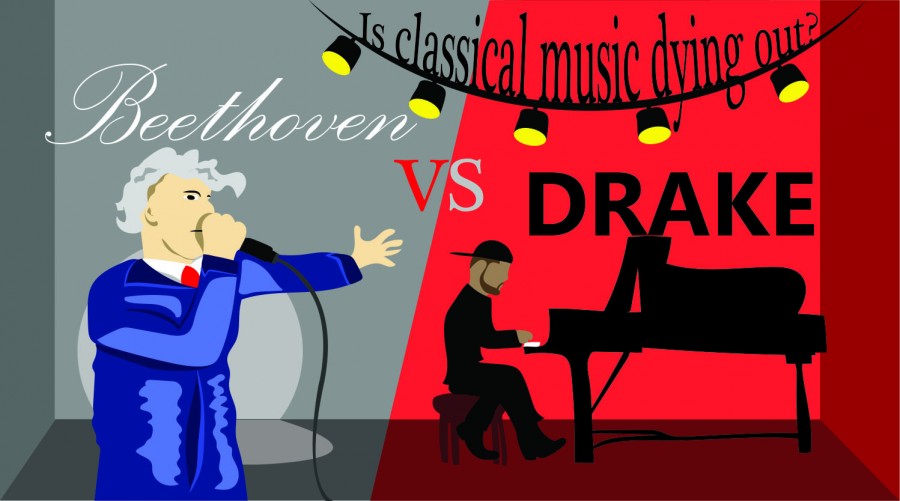Debate over the state of classical music
February 8, 2016
Imagine, a palace room packed with audience members and musicians. White-powdered wigs block the views and silk fans are the only air conditioning for the next few centuries. A man walks to the center of the room and begins conducting the orchestra.
Could you imagine this setting with the orchestra playing Beyoncé instead of Beethoven? Sia instead of Scarlatti? Luckily, cultural developments have led to a change in audience as well as the music itself. Those who prefer Classical music happily attend traditionally formal concerts while those with more modern tastes attend concerts at stadiums with louder music and louder people.
However, many people think dominant culture has started to leave Classical music behind to the older generations. There is also a growing stereotype of elitism within the Classical audience as well, which further distances those who don’t have certain levels of appreciation for various composers, genres, and instruments.
Looking at the approval ratings, Billboard released its annual list of the Top 200 Albums with David Bowie’s “Blackstar” coming in at No. 1 and Adele’s most recent release “25” following close behind, yet nowhere on this list can you find a Classical album.
In searching for other answers and interpretations, I went to Coppell High School choir director Joshua Brown, who also co-teaches the Advanced Placement Music Theory course.
“I believe the reason certain pieces have lasted as long as they have is because they have been vetted and stand the test of time,” Brown said. “I think they’ll continue to be standards and staples of whether the vast majority of people listen to them regularly or not. I still think [classical music] will always have its place.
“I think when people think ‘classical’, they generally think ‘Well, the Dallas Symphony is performing a standard piece of music’ and what’s happened is music that’s composed in different periods of time may have been more accessible to the general public or people who maybe didn’t have the money to sit in $100 seat at the Meyerson, but over time, it’s evolved into an elite thing.”
We also talked about how musicians are trying to find innovative ways to spread the influence of Classical music.
“Musicians…are having to seek out more innovative opportunities to perform that maybe gets the Classical music out there more and out of the concert hall and into maybe parks,” Brown said.
What many orchestral groups, companies, and organizations are doing is performing the works of great musical masters in informal settings such as amphitheaters and parks. By doing so, classical institutions like the Berlin Philharmonic, which plays annually in an amphitheater in Waldbuhne, Germany, allow families to buy cheaper tickets and have picnics while enjoying less formal pieces, such as its recent performance of John William’s various works in the “Star Wars” franchise.
Possibly the main reason there has been such a shift in popular demand of Classical music is simply due to the industrial development of listening to and enjoying music. Before the invention of the phonograph in 1877, all music had to be sought out by a performer or a group of performers. Then they had to practice and prepare the music, then perform the work for an audience.
Want to listen to your favorite song over and over again? You can’t – the performer is done for the night, and they might not play the song for another five months depending on their schedule. If your family was rich enough, this wouldn’t be such an issue. Just hire a person to write, orchestrate, and of course perform, all of the music that you’ll be listening to until they die.
Here’s the catch. It’s just that one person, because it would be rude to have any other in-residence composers at the time. And for those of you who love your female vocalists, sorry. Girl groups aren’t a thing. They aren’t even allowed to hold official positions unless they’re taught in order to marry a husband who may or may not enjoy music. Once people were able to adopt newer ways to listen to more music, and do so repeatedly, they immediately moved on, thus leaving the old-world standards behind them.
Is this change for the better of the musical industry, or for worse? I believe that it is neither, because even though the population of people who regularly listen to Classical music is getting smaller, the way we are able to enjoy music is what balances this harm out.











